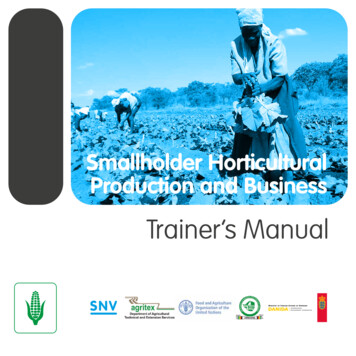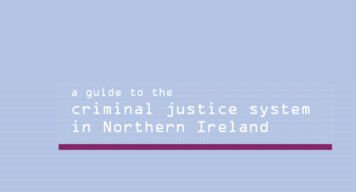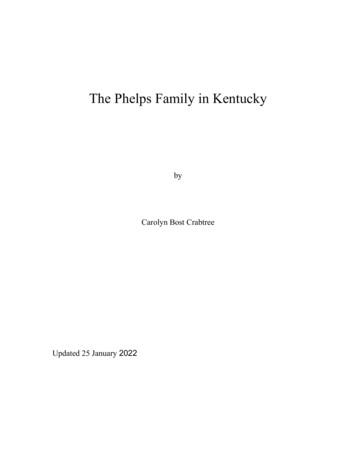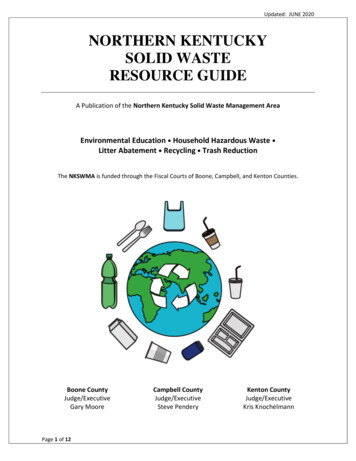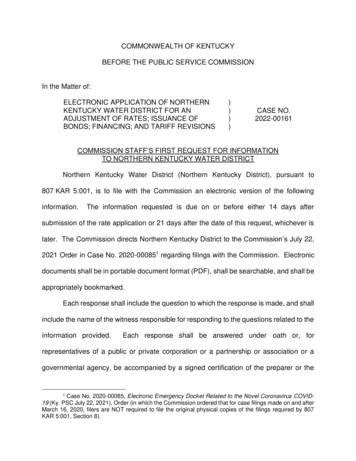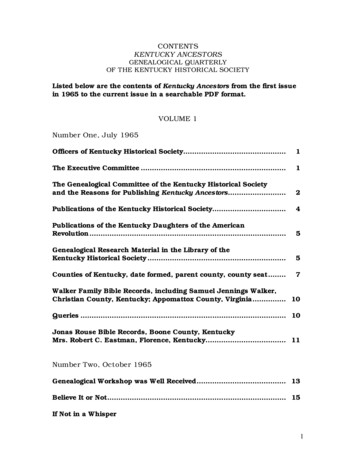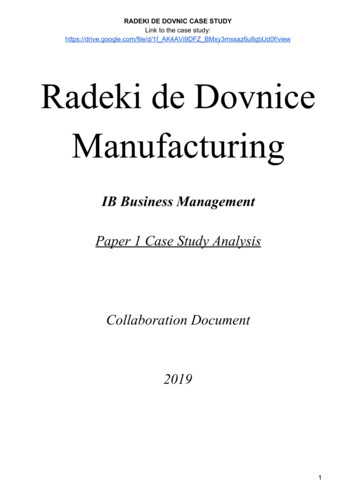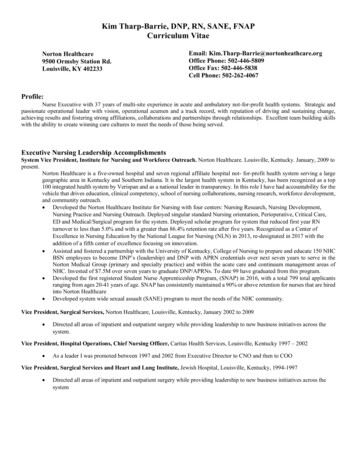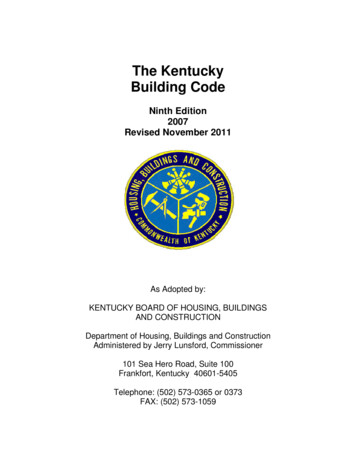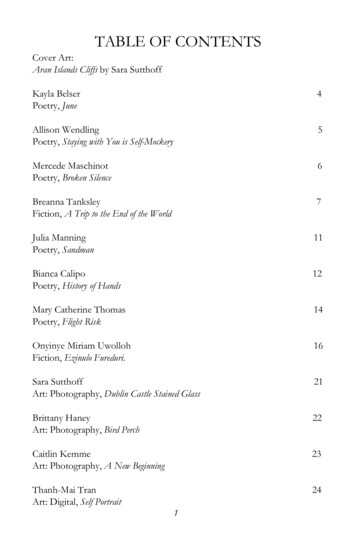
Transcription
TABLE OF CONTENTSCover Art:Aran Islands Cliffs by Sara SutthoffKayla BelserPoetry, June4Allison WendlingPoetry, Staying with You is Self-Mockery5Mercede MaschinotPoetry, Broken Silence6Breanna TanksleyFiction, A Trip to the End of the World7Julia ManningPoetry, Sandman11Bianca CalipoPoetry, History of Hands12Mary Catherine ThomasPoetry, Flight Risk14Onyinye Miriam UwollohFiction, Ezinulo Fureduri.16Sara SutthoffArt: Photography, Dublin Castle Stained Glass21Brittany HaneyArt: Photography, Bird Perch22Caitlin KemmeArt: Photography, A New Beginning23Thanh-Mai TranArt: Digital, Self Portrait241
Thanh-Mai TranArt: Digital, Hong Kong25Cora AngelArt: Photography, OTR Sneakers26Adil AkhtarArt: Photography, Child Digging Through Trash27Gabriella DelaneyArt: Photography, Hibiscus Shower28Jason HoustonArt: Photography, A Peak into Norse Nation29Maria DeWaldArt: Photography, Fate30Maria DeWaldArt: Photography, Phases31Bianca CalipoArt: Drawing, Selkie Split by Past and Future32Mikaylah PorterPoetry, on the inside33Cameron WellsPoetry, Spinning Wheel34Kayla BelserPoetry, Playground35Camden MecklemFiction, The Nature of Things36Alexandria RoyPoetry, Our Mountains432
Breanna TanksleyPoetry, I’ve Been Trying to Write an Honest Poem44Elizabeth OsifalujoPoetry, Letter to HEART46Allison WendlingCreative Non-Fiction, Biological Retention47Contributors523
Kayla BelserJuneI pray in front of plants named after my ancestors.I hear my grandmothers voicebefore I dare leave the house without a winter coat,change a baby’s diaper without fresh powder, ormend and mold yeast rolls without patience.In the mirror I am memories;My mother cries at my reflection.4
Allison WendlingStaying with You is Self-MockeryI don't know why I think of you so compassionately /your grip around my neck made me feel like fruit too ripe to pick /your trembling fist could not unroot me from the spot where I was /bracing against the doorframe /but the stem cracked, a brow bone was bruised /and like a peach when it is dropped, I am sweeter where the impact shows /softer where you've made your mark /I mourn when my finger straightens out again /panic when evidence of your grip fade /and oh - you stand waiting for coffee with me /and you know what it means when the skin on my face crumples /the edges between you and I are dulled /and no one picks the lint off my sweater like you do.5
Mercede MaschinotBroken SilenceWe shared seat confinement.I averted my eyes and muted our confrontation,beside the emergency exit window.Then, you staggered into the aisle.You were red in the face, hands trembling,breathing heavily without air.You stumbled off at your stop,the back of your head in retreatto a cul-de-sac of finality.The bad taste in my mouth said“I deserve this,” because to methe blood pounding in your ears isdeafening.6
Breanna TanksleyA Trip to the End of the World“Shhhhh.” Sara tried to hush her ringing alarm clock, to no avail. Sherolled over to silence the tone and squinted from the dorm room light thathad been left on. She slid out of bed, still jean-clad from the day, and onto herfeet. As she made her way to the sink, she stumbled over her suitcase andsighed.The clock on the wall said that it was a quarter till three in themorning. Sara splashed cold water in her face. It made her ebony skin glistenand reminded her of how her mother would burnish her forehead and cheekswith oil before sending her off to school as a child. The glossy coating, hermother would explain on winter mornings, was to protect from the bitter coldand wind. It might be cold when I get there, Sara thought. She made her way to thecloset, limbs heavy, and took out her yellow jacket. She started buttoning—but, what if it’s too hot?—and then unbuttoning. Sara stood beside her suitcase,yellow jacket glowing against her complexion and misbuttoned all the waydown. This is what you wanted, she reminded herself, this is what you wanted.This was what Sarah wanted, at least at one point. Nearly a year ago,Sara had purchased her ticket to the annual viewing of the End of the World.She had spent a whole other year prior to that just saving for the ticket. Whenshe was nineteen, a few of Sara’s friends, coworkers from her school's campusbookstore had come up with the spring break plan. It seemed exciting then,when the End of the World had just opened, and it was more than the touristattraction that it had seemed to become. Back then, the world seemed to buzzwith excitement over it. The rich were the first to view it. The poor had nohope of ever visiting, and middle-class families began to make vacation plans.No cameras or recordings were allowed, which made the place all the morealluring. That old concept of the astonishing and peculiar End of the Worldno longer existed in Sara’s mind, though, and those bookstore friends were adistant memory now.Sara stooped to retie her shoelaces, tighter this time. Her heartskipped a beat at the sound of her kneecaps popping, and she released abreath. There was a buzzing vibration in her side pocket, signaling her togather her things and leave. Sara looked over the room again before turningout the light. It was tidy.#“Thank you again for the ride to the airport,” Sarah said.“No problem,” Izzy said behind the wheel. She worked at Sara’s newjob, a small cafe in their college town. She took a long sip of coffee. “Wish Icould come with you. I’m excited for ya. This is gonna be like a big existentialthing, I think.” Sara shrugged, but the light in the car was too dim to see. Izzy7
tapped Sara on the arm for a response.“Wake up, sleepyhead. This is going to be one of the most excitingthings you’ll do in your life. Maybe you’ll find yourself!” Sara straightened upin the seat, determined to look alert, just to prove that she was listening.“Maybe,” she muttered bitterly in the dark. Immediately she hopedthat Izzy had not heard. “I hope so!” Sara tried again in a brighter tone.Sara had slept through the entirety of the eleven-hour flight thanks tothe melatonin supplements that she had taken. On the train ride, though, sheremained alert. She watched the greens and blues and yellows of the lush,midday countryside passing behind her, and tried to let it ease her mind. Shewas not sure why she was full of dread when the plan was to wake uprefreshed and calm. This is what you wanted, she continued to remind herself.She unbuttoned her yellow jacket. The air on the train was thick and hot.Sara looked down at her watch. She was already two minutes behindschedule and counting. She did not know why the train ride was taking solong. Her own, and the terminal’s calculations, said that she ought to be in acab by now on her way to board a ferry that would take her to the End of theWorld. This frustrated her. Sara’s eyes moved from the second hand of herwatch to her fingertips. The nails were bitten down and unsightly. She turnedback to the window, repulsed.As she gazed out of the window, Sara thought of the time leading upto her trip. It felt like much more than a couple years ago now that thepresident had come on the television screen and announced that the planetEarth was, indeed, flat and it did have an end. She remembered the outrageover how that truth had been suppressed; the riots in the inner city, and themarches around the capital. She remembered how quickly it had subsidedonce people began to understand why this obvious fact had been hidden fromthem. It had been for their own good. The older generation had felt foolish,and many of the generation before that, continued to believe that the Earthwas round. It was true that the masses had been deceived. After all was saidand done, though, no harm, no foul.#Though Sara feared that she would never arrive at her destination, shedid. As she boarded the boat, she noticed the jagged island in the distance. Itwas a dark, silhouetted object jutting out from the water. Peculiar in form andeven more peculiar in function, as the ferry neared the shore, the passengersnoticed that the island was smoking. “Look at that,” Sara mouthed to herself.At any volume, her words would not have been heard over the chatter of thevessel. A volcano, she thought, and she felt her heart jump in speed. Itthumped. As they neared the shore, however, Sara noticed that the smokingobject was no natural formation at all. Rather, it was a gargantuan metalelevator carved into the side of a mountain. Its function was to transport thepassengers to where the viewing would be held. As the boat came closer, Sara8
watched as the machine screeched and opened its gaping mouth. It wretchedand out poured the last of the previous tour group.The End of the World was an island shrouded in fog, cut throughwith bright and colorful lights. Some of them blinked, some of them strobed,and others danced. It’ll be like the county fair. Sara tried to deceive herself forcomfort. She had not expected the End of the World to feel so unfriendly. Asthe ferry approached the island, Sara began to feel ill. I don’t know what’s wrongwith me. I can’t breathe. She wanted to attribute her discomfort to her positionon the crowded boat. That’s why I’m sweating. Everyone is. I just need some water. Ican’t breathe. I just need some air.The ferry arrived with the tour group onto the rocky Earth. The ridehad been crowded, and all of the passengers were touching shoulders, if notmore. Upon arrival, the shore flooded with anxious bodies of all shapes andsizes, tripping over one another and tripping over the rocks. Sara heard a childshrieking in the distance. She looked around for the source of the sound.Wherever it was coming from, the body was far too fast and much too smallto be found in the rushing flood. We’re like a school of fish caught in a current, Sarathought. Only, she thought again, we’re the current too, and in the chaos she couldfeel each grain of sand that was collecting in her shoes.I need to find some water, Sara thought to herself. There were little shopsscattered around the island, painted with bright pastels and bearing neon signson their faces. Surely, there were vendors selling bottled water behind theblinking lights, but what Sara really sought was a quiet place. She tried toweave through the crowd and lasted for a couple seconds before the bumpingbegan. To the birds above, she must have looked like a yellow fish bobbingagainst the current. Upstream, she swam against bodies, beaten against themlike rocks and shards. Sara kept her head down with her hands over her earsand fought. She fought for a long time until finally, she no longer felt theforce against her body. When she lifted her head, there was no one around.Her footprints seemed to go on forever in the sand behind her. She lookedout to the sea in front of her. It seemed to go on forever. The tides letthemselves be pulled to and fro, and with control relinquished to the moon,they did not seem to fret over this pulling. The water was dark and contrastedwith the hazy gray sky above. All of the exhaust from the elevator, Sara thought.The monstrous machine was nowhere in sight. It must have been tucked awaybehind a mountain with the rest of the world.Here, the sand was white and sparkling. Sara rested her clammy handson her knees. This must be the last untouched piece of the Earth around. Then, shenoticed herself. She rolled up her sleeves to reveal arms covered in purplebruises from pushing against the crowd. Her abdomen was the same. Sorelaughter bubbled over in her aching body: In her yellow jacket, Sara lookedlike a bruised banana. She laughed until she vomited onto the flat sand. Relief.And then shame. She covered the spot with her bright jacket. It glowed9
against the cool landscape. With her knees no longer wobbling, Sarastraightened up and walked back in the direction of her footprints.By the time that Sara made it back, the elevator was closed, and thetour group was being herded off of the gray island and back onto the ferry.Sara did not check her watch to see if they were on schedule, or how manyminutes of downtime she would have before she had to check into the hotel.10
Julia ManningSandmanSleepless nights describe my china dolls.No matter how many times I brush their hair,those small eyescould not close, but stare.Because their eyes are filled-a gunk of mucus and moisture.They would not sit stillor have proper posture.Suck upa child’s tears from a dream.Sweet rosy cheeksand violet puffy lips.To be a charming antiqueonly to resemble a hopeful dream.11
Bianca CalipoH istory of H andsThe Mute reveals his mind through twins,conjoined to him like the currents,palms sway as the ocean’s voice,fingers compose with words,silent anddeep“Pay attention,”The Mute speaksand pointsdon’t give yourself,inland is dangerousFinless people, they need him they need him,they really, really need himdependence is an invisible net,slowly suffocating hismind grows colder in thedepths fingers diggingthrough freckled flipperssore spinewrithingskinThey steal from himDoes he really haveA voice?Knowledge to provide isfished without mercyWhat matters is what theythink, feel, saythe worlds above can’t hearbelow the water’s skinto evolvethey need it12
Enter a room with no doorgut the walls, scale off the rooflike a fish, those eyes are alienthere’s no soulOn land they thinklegs riseaboveallContinuing to take and take and takefearing any plunge into the deepdon’t worry, just sew onreplacementsanother timeleave less andless ofhimeverydayThe star can’t hear, it lives upstairswith an infinity of siblings far awayproviding life,and taking it,Threats ofevaporation.13
With the history of his hands,Feeling afraid, the Mute fledfarfarawayHis twin hands wondered iftheir past, present, or futureeven mean anything14
Mary Catherine ThomasFlight RiskSometimesI just want torun awaybut thenI rememberI alreadyran awayand this is where I landed15
Onyinye Miriam UwollohEzinulo FureduriIntroductionLittle is known about Frederick Douglass’s lineage beyond the names of hismaternal Grandparents. Douglass published his second biography titled My Bondage andMy Freedom; in the Yale University Edition, a footnote on page 43 gives furtherinformation. It reveals that “Harriet Bailey [was] the second of twelve children born to Betsyand Isaac Bailey, in whose cabin Frederick was born [He] was one of six children born toHarriet Isaac Bailey was a free black man [and] Douglass was part of the fifthgeneration of the Bailey family to be born in America.” This then begged the question—What about the generations of Douglass’ ancestors that were born outside America, mostlikely in Africa?This short story creates a fictional framework for Douglass’ ancestral tree byimagining that his foremother was from the fictional Muojeke lineage of South EastNigeria. The setting is the fictional village of Adazi, and through the ability of the villageshaman to see across oceans, the Muojeke clan has kept themselves updated on the lives oftheir descendants. As the British had yet to establish any colonies in the Nigeria of the mideighteenth century, they would have had no knowledge of the English language. Therefore,this inspired the Igbo-pronounced versions of the known characters’ names. This is a storytold from the perspective of the shaman.(Glossary on Page 20)#I hear multiple footsteps approaching the shrine. As the cockerel hasyet to crow his greetings this Afo morning, I know that it is the MuojekeEzinulo approaching. I rise from my crouch by the doorway and peer downAmadiaoha’s hill. Through the early morning mist, I see that leading the way isObidike Muojeke, and with him are his three wives Ijeoma, Chinyere andNgozi. As the ceremony that is about to be performed is not one for nwatakiri,at first, I am surprised to see young Chibuzo at the back of the party. Isurmise that her first blood must have occurred since the last sacrifice andnote that this time she is the one leading the pure white ram on its rope. Hermother, Chinyere, is bearing the alligator pepper and cowries, while Ijeomaholds the required 5 man-heights of white cloth. Ngozi, the youngest wife,balances a clay pot of palm oil on her head as per my instructions. Finally,Obidike reaches the top of the hill and as usual, in his hands is a basket ofkolanuts that have never touched the ground.“Otutu oma, onu Amadiaoha,” the whole family chorusesAs per the ritual, I respond by placing my hands on each of theirheads before speaking.“Ezinulo Muojeke, declare to Amadioha why you have sought his16
presence today!”“We have come to seek that which was lost,” is the reply.I gesture for the family to kneel and return into the shrine to retrieveThe Eye of Amadioha.The Muojeke Ezinulo comes to this hill every ten years to perform thescrying ritual. Everyone in the village of Adazi knows this as it pertains to theirroyal family. As the current dibia, it is my duty to carry on the ceremony as myforefathers did. I pick up The Eye of Amadioha and its white ribbon is starkagainst the day’s mist; the calabash that sits at the foot of Amadioha’s statuehas already been prepped for today by my boy, Buchi. It holds water from thestream thrice run over Amadioha himself.The Ezinulo members kneel as I emerge from the hut and Obidikealone remains standing as befits his status as Igwe. I gesture for him to invokethe history of this gathering and he begins:A pale people in search of land set out to conquer allTo make themselves feel bigger, they tried to make others small:“They lack knowledge, and so we should use them for menial tasks”Not knowing that the villagers had thus begun to ask:“Who are these pales, and what is their intent for our land?Adazi will never fall into their hands”But sadly, in Adazi, with its boundary of stoneThere existed a traitor which to the villagers was unknownFor by the river, on an Eke market dayAnuri, our daughter, was stolen awayLittle Ogechi watched from the reedsAnd ran to inform their mother in speedThe invaders heard the noise and were forced to fleeAnd abandoned the plan to steal not one but threeWith their weapons of clubs, spears, and machetesSo, did the brave men chase after ndi Onye oshiIn defeat they returned, for to their great sorrowA big canoe had sailed with Anuri down the river IroThe town crier ran ‘round announcing the search had failedThe men beat their breasts and the women wailedMany moons and rains have passed since thenBut the Muojeke never forget their kinOur daughters keep passing on their people’s willIn spite of the Oyinbo causing their blood to spill17
With this final line Obidike reaches into his basket, selects a kolanutand hands it to me.“He who brings kolanut brings life!” I exclaim as I invoke the age-oldblessing over the favored nut.“Eeeeee,” responds the Ezinulo, as is proper.I break the kolanut and it reveals 7 lobes—a rare number indeed, as itrepresents good fortune. There have been six generations lost since Anuri,and the stories have been passed down from my father and his father and soon. Even now in the Muojeke burial plot, these lost kin were added to the listof ancestors as their deaths had been revealed to us dibia. Anuri had given herchildren the names of Chibike, Nnenna and Emeka; Nnenna could only nameone child as all the others were taken from her as soon as they were born. Shecalled him Ifeanyi, and the Ezinulo had shed tears at this revelation.By this time Nnenna had born six children under the duress of fourdifferent masters, and had forgotten the Igbo tongue. This left the Ezinulo atthe time with no way to understand what the Oyinbo were saying. Furthermore,all of her children bore names that were difficult to pronounce except forIfeanyi, who was her seventh child. It had shocked the Ezinulo when Ifeanyihad a child with an onye ocha and this son marked hope for the clan as he wasthe first of their lost kin to be furi. They eventually learned that his name in theonye ocha’s land was Azik Beeli, however the Ezinulo fondly referred to him asNnamabia in commemoration of his being his father’s carbon copy.Nnamabia was the first to also have some sort of marriage ceremony,although the Ezinulo females wagged their tongues at the lack of traditioninvolved. Nevertheless, they were delighted with Bechi Beeli’s love for him andtheir children. Their daughter was called Harieh and once again they mournedat the onye ocha forcing themselves on her. Ezekwem, Obidike’s father and thecurrent head of the clan at the time, had wished to stop communing withAmadioha at that point. However, my father Chikeluba, gave them good newswhen Harieh’s sixth child, Fureduri, was born. He spoke of his arrival being agood omen for the Muojeke clan and how he would break their chains ofsorrow. After that day, my father began training me to take over as dibia whenhe died.Enough seasons passed that Obidike took his first wife and secondwife. Then in the Harmattan prior to my father’s death, the Ezinulo came toscry and saw how bruised Fureduri had become under his owners’ tyranny. Bythis time Obidike had become the head of the household and had beencoming for the ritual since Ezekwem was too old to climb the hill. He hadpleaded with my father to allow them to intervene on Fureduri’s behalf. Theywere lucky Fureduri had encountered a fellow Igbo man in America who gavehim an akpu root, albeit a less potent one. Nevertheless, by promising to bringback a white chicken, my father Chikeluba allowed Fureduri to receive18
Amadioha’s blessing in his fight. After all, it would not do for a Muojeke son tolose at wrestling. It has been ten harmattans since then, and once more theEzinulo are back. As my preparation of the kolanuts ends, I turn my musingsback to the ceremony at hand.I am startled back into concentrating on the Ezinulo by Chibuzo’shand impatiently reaching for a kolanut lobe. Her mother turns andappropriately cautions her with her eyes as I begin handing a lobe to eachmember of the Ezinulo sans Chibuzo. Since a seven-lobed kolanut has neverbeen broken in the history of their coming to Amadioha, I can see the hopethat dawns on the Ezinulo despite the bitterness of the kolanut causing themto grimace. Amidst sounds of crunching, my son, Buchi, makes multiple tripsin order to move all the offerings into the shrine. By the time he is finished,the five offered lobes are all eaten, and the remaining two are placed atAmadioha’s base. Silence reigns as the mist begins to clear amidst the first raysof dawn.Buchi hands me the calabash and as silently as he came, retreats intothe shrine. At this point the Ezinulo are still waiting with bated breath. I beginto chant, occasionally dipping the ribbon of The Eye into the calabash. Thecrescendo of my adulations draws near, and I see images begin to form in thestill waters. As is the custom, Obidike leans forward since only males areallowed to peer at mysteries revealed by Amadioha. He gasps, since for the firsttime Fureduri is seen by the sea without the presence of an owner hanging overhim. Many men are around him and canoes of different sizes frame the image.Stunned, Obidike meets my eyes and I nod in affirmation of the thoughtwritten on his face. The Muojeke patriarch turns to his household and declares“Fureduri is furi.”19
Glossary (in order of appearance)Afo - The third of the four Igbo market daysMuojeke - The family’s last nameAmadioha - The Igbo god of thunder and lightning; the most popular deityNwatakiri - A young childOtutu oma - Good morningOnu Amadioha - Voice of AmadiohaEzinulo - FamilyDibia - Native doctor/ShamanIgwe - KingEke - The first of the four Igbo market daysNdi onye oshi - ThievesOyinbo - ForeignersOnye ocha - White peopleAzik Beeli - Isaac Bailey; FD’s grandfatherNnamabia - Igbo name which means “my father has come”Bechi Beeli - Betsy Bailey; FD’s grandmotherHarieh Beeli - Harriet Bailey; FD’s motherFureduri - The one and only Frederick DouglassHarmattan - The dry season20
Sara Sutthoff: Dublin Castle Stained GlassPhotography21
Brittany Haney: Bird PerchPhotography22
Caitlin Kemme: A New BeginningPhotography23
Thanh-Mai Tran: Self PortraitDigital Photoshop24
Thanh-Mai Tran: Hong KongDigital Photoshop25
Cora Angel: OTR SneakersPhotography26
Adil Akhtar: Child Digging Through TrashPhotography27
Gabriella Delaney: H ibiscus ShowerPhotography28
Jason Houston: A Peak into Norse NationPhotography29
Maria DeWald: FatePhotography30
Maria DeWald: PhasesPhotography31
Bianca Calipo: Selkie Split by Past and FutureCharcoal on drawing paper. 55’’ x 90’’32
Mikaylah Porteron the insidethere is a decomposing composition.a kaleidoscope of contorted waves surrounds me,where cotton candy melts into oil,and the jewel of my birthbecomes a clouded memorytwisted.jubilant crimson blush,and how the sunrise breathes me in,makes my smile aureate.with the verdurous cloth on my stomach,and the azure ribbon tied around my wrist.oh, how it matches my crown!a crown of poisoned thorns,slashing my veins, blackening my skin,battered, bruised, and bleeding,with glistening toxicity,I become ashen rot.it flows from the wound in my chestwhile I decay.it’s terrifying to leap into the dark,but art must still be made.33
Cameron WellsSpinning WheelA potter sits down to shapeThe slipshod clump of gray earth mud.Spinning wheelAdding water to increase plasticityApplying pressure to the clumpThe water weakens and loosensThe pressure shapes the form.Spinning wheelThe form sometimes takes its own shapeSo it must be crumpled and remade.Spinning wheelThe reforming process allows for impuritiesTo be removed and discardedThe potter knows what stays,And what goes.Spinning wheelTransfiguring the insignificant lumpInto a fine crafted vesselThat the potter will useDay after day.34
Kayla BelserPlaygroundWe hid away in the yellow tube.Through foggy circle windowswe watched the wicked sisters dance.Leaves tumbled down, we knew they would not find us.A brief pause from their torment.No pulling of my wool ponytails,or mocking Marilyn for wearing the same shoes each day.I wondered when our thirty minutes of hiding would be over whenMarilyn pressed her lips against mine.She turned away, before I could ask why.We stepped out of the yellow tubeClouds covered the concrete in shadows.We stood neatly in our lines but,even then, I knew I would be hiding for muchlonger.35
Camden MecklemThe Nature of ThingsWe The marina glowed silver before the sun came up. The light fromthe starry sky drained the color from the tire-trampled dirt on the access road.You could have looked down and thought you were on the moon, boot tracksand all. That was how it looked in the old days, Henry remembered, when hewould ride down in his dad’s Cadillac with his friend Theo in the back and thealuminum boat clattering behind. As the car would turn onto that dirt road itwould bump so viciously that Henry and Theo would cup their hands overtheir mouths and pretend they were astronauts. Commander Theo, now in orbit—over, his friend would say, and he’d respond: Vision’s clear here from the buggy.Henry out. Of course they would always pace their show for the moment thecar stopped, and Henry would step out first, announcing as his shoe hit thedirt that he’d taken One Small Step for Man.There used to be a small concession shop here, but now only themetal frame remained. Henry would have forgotten the shop, but a suddencraving reminded him of how those childhood trips always started with icecream cones. The novelty of the ice cream so early in the morning had neverworn off on them. He and Theo would stand by the boat, still on its trailer, asthey savored each lick and Henry’s dad paced around anxiously. By the timeyou’re done the sun’ll be up and there won’t be fish to catch, he would say, but then hewould pass the time chatting with one of the other middle-aged men nearby,the fly fishers and bass fishers and sightseers.But today, all these years later, the crowd was gone and Henry stoodalone. He didn’t care so much about the time. Summer kept the sunrise earlyand the temperature comfortable. He drove the truck toward the ramp andcarefully aligned the boat so he could get out and roll it into the water. Therewould be no need to move the truck out of the way, he figured. The boat slidinto the murky brown lake with a sploosh. Henry tied it to the pier and strodeback to his truck, keeping his mind set in the old days, imagining his fatherand Theo standing nearby. The tackle box had become discolored with age, adull plastic beige like old computers. It didn’t rattle like it used to. The soundit made was more like shifting sand.As Henry hoisted the nearly empty tackle box into the boat, he hearda low hum from over the hills on the other side of the lake. He sighed andtried to tune out the machines. He thought they would have covered the lake36
area by now, but they must have been behind schedule. A thin green cloudrose from the horizon. Routine work, whatever they were doing. Themachines had appeared every day for the past few weeks. He kept his gaze onthe boat engine. In moments it sputtered to life and carried him out into openwater. He lowered himself to his knees and looked through the bottom of theboat for leaks but found nothing. The cloud dispersed into fog.The marina drifted out of view. He doubted that he was far away, butthe fog—whose verdant tint he tried to ignore—obscured anything fartherthan a few hundred yards. All he saw from this new distance were the ripplesleft by the boat, spreading farther apart until they disappeared. On either sideof him were silhouettes of land; willows and cattails and bulrushes appeared asghosts in the fog while dead trees rose up from the coastline with barebranches jutting out like dark bolts of lightning. He wondered if those treeshad been alive when his father, Theo, and he came this way so many yearsago—if the willows had memory, if they could recognize him as that curi
The ferry arrived with the tour group onto the rocky Earth. The ride had been crowded, and all of the passengers were touching shoulders, if not more. Upon arrival, the shore flooded with anxious bodies of all shapes and sizes, tripping over one another and tripping over the rocks. Sara heard a child shrieking in the distance.
